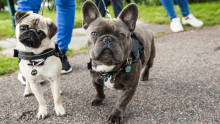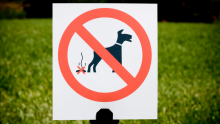By Nicole Abrego
There are many joys to being a dog owner including wet kisses, belly scratches, and the unyielding loyalty and love a dog shows for their human. Unfortunately, picking up your pup’s poop isn’t the most glamorous perk of owning a dog. You may even be inclined to skip this step at times while walking your dog around the neighborhood. But did you know that not picking up after your pet can be detrimental to your community, pets, and other humans?
In honor of International Pooper Scooper’s Week, here are 5 Reasons to Scoop the Poop!
Dog Poop is NOT Fertilizer
Contrary to popular belief, dog poop is not a natural fertilizer. Dog poop is too toxic and acidic and can actually destroy the grass underneath it if left lying around. Additionally, you should not compost your dog’s feces and use it to fertilize your vegetable or fruit gardens as this can contaminate the food your garden produces with harmful bacteria. So if your pup has left stool out on your perfectly manicured lawn (or someone else’s) it’s best to scoop that poop right away to avoid any damage to the grass.

Dog Poop Pollutes Waterways
According to the U.S. Environmental Protection Agency (EPA), dog waste is classified as a pollutant, meaning that dog poop is in the same category as oil and chemical spills! This is due to the fact that dog poop contains two types of pollutants: pathogens and nutrients. Additionally, it takes a considerable amount of time for dog poop to decompose. Most dog poop left in yards can end up in our waterways after rain, releasing these pathogens and nutrients into our lakes, streams, oceans, and drinking water. This can lead to pollution of our water sources and harm the plants and wildlife that live in and near these sources of water. For example, the nutrients released from dog feces can stimulate the growth of algae which could lead to toxic algae blooms in outdoor bodies of water, which can have devastating effects on those who come into contact with it.
Dog Poop Can Expose Other Animals AND Humans to Disease
Dog waste can be a host of multiple types of bacteria and parasites that can lead to disease and illness. Even if your dog is not displaying symptoms of illness, their feces can still spread disease that can harm other pets, animals, and humans. Some illnesses and organisms found in dog poop include:
- Parvovirus
- Leptospira
- Giardia
- E.coli
- Salmonella
- Roundworm
Even if you or your pet don’t come into direct contact with infected feces, other animals such as rodents, flies, and other wildlife can transmit disease to others. If left untreated, some of these diseases spread by dog feces such as Parvo or Leptospirosis can become deadly to pets and possibly humans. In short, dog waste is a catalyst for spreading unnecessary disease around the community and should never be left around without proper disposal.

It Smells Gross!
Having multiple mounds of dog waste laying around not only looks bad, it SMELLS bad too! The smell of dog feces is distinct and can quickly become overwhelming. Do your community, your neighbors, and your nose a favor and pick up after your pooch to help keep your environment clean and stink-free.
It’s A Common Courtesy to Pick Up After Your Pet
There is not much that can ruin your day more than stepping in a stinky pile of dog poop, especially when you’re out and about. It’s terrible to have that experience yourself, so leaving your pet’s waste around for someone else to step in is just inconsiderate. Part of being a responsible pet owner is picking up after your pet. It’s also required by most laws, especially in public spaces and neighborhoods with HOAs. Picking up your pet’s waste not only benefits your environment, this small act benefits your fellow neighbors and their pets as well!
We hope these reasons will help convince you about the importance of picking up after your pet. So when you’re out on your next walk around town with your pooch, keep those biodegradable doggie bags handy and remember to scoop the poop!
Have any questions or need to schedule your pet’s next appointment? Contact us here.
The Drake Center for Veterinary Care is an AAHA-accredited animal hospital located in Encinitas, CA. The Drake Center loves being a source of information for all pet owners across the country however if you have any questions regarding pet care and do not live in Encinitas, CA or surrounding cities, we encourage you to contact your local veterinarian.

